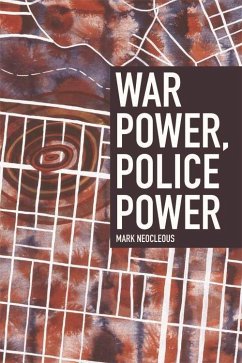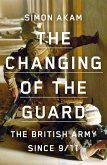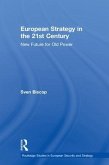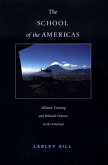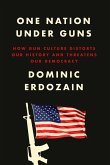'Neocleous already has an international reputation for his previous research along similar themes. In a sense, he is his own trend here. But this new book makes a significant contribution to the literatures on policing, political economy, security and international relations. It completely reimagines connections between war, liberalism and terror and excavates the lineage of capital accumulation as a project of pacification. It is more than radical. It completely upends what we think we know about the modern global economic system.' George S. Rigakos, Professor of the Political Economy of Policing, Carleton University Waste, Drones and No-fly Zones Why is liberalism so obsessed with waste? Is there a drone above you now? Are you living in a no-fly zone? What is the role of masculinity in the 'war on terror'? And why do so many liberals profess a love of peace while finding new ways to justify slaughter in the name of 'peace and security'? In this, the first book to deal with the concepts of war power and police power together, Mark Neocleous deals with these questions and many more through a radical rethinking and critical theory of war power. Neocleous conducts a critical exploration of the ways in which the war power and the police power are intertwined in the form of state violence and exercised in the fabrication of order. This is not a book about an institution called 'the military' and how it connects to an institution called 'the police' but is, rather, a critical exploration of the ways in which powers of war and powers of police coincide in the exercise of violence and for the purposes of social ordering. The book takes the reader down some unexpected paths: the 'war on waste', debates about effeminacy, the proliferation of resilience and trauma-talk, drones as the culmination of colonial bombing campaigns and no-fly zones as the perfect accompaniment for drones. The result is a compelling book that articulates a vision of war/police power beyond the military and the police. It generates a provocative set of claims about state power and capital accumulation, the role of violence in the making of liberal order, the police wars at the heart of this violence and the ways in which these processes come to be called 'peace and security'. Mark Neocleous is Professor of the Critique of Political Economy, Brunel University, UK. He is the author of several books, most recently Critique of Security (Edinburgh University Press, 2008). He is also a member of the Editorial Collective of Radical Philosophy. Cover image: Philadelphia, the Firebombing of M.O.V.E., United States, 1985 (from the series Bomb After Bomb: A Violent Cartography), 11 people are burned alive, along with an entire city block, when the Philadelphia Police Department drop an incendiary bomb from a helicopter onto the roof of M.O.V.E.'s building because the separatists refused to come out and face the police firing squad. elin o'Hara slavick, 22"x30" mixed media on paper, 2000. Cover design: [EUP logo] www.euppublishing.com ISBN 978-0-7486-9237-8 [please add within the barcode box, at the top] Barcode
Bitte wählen Sie Ihr Anliegen aus.
Rechnungen
Retourenschein anfordern
Bestellstatus
Storno

